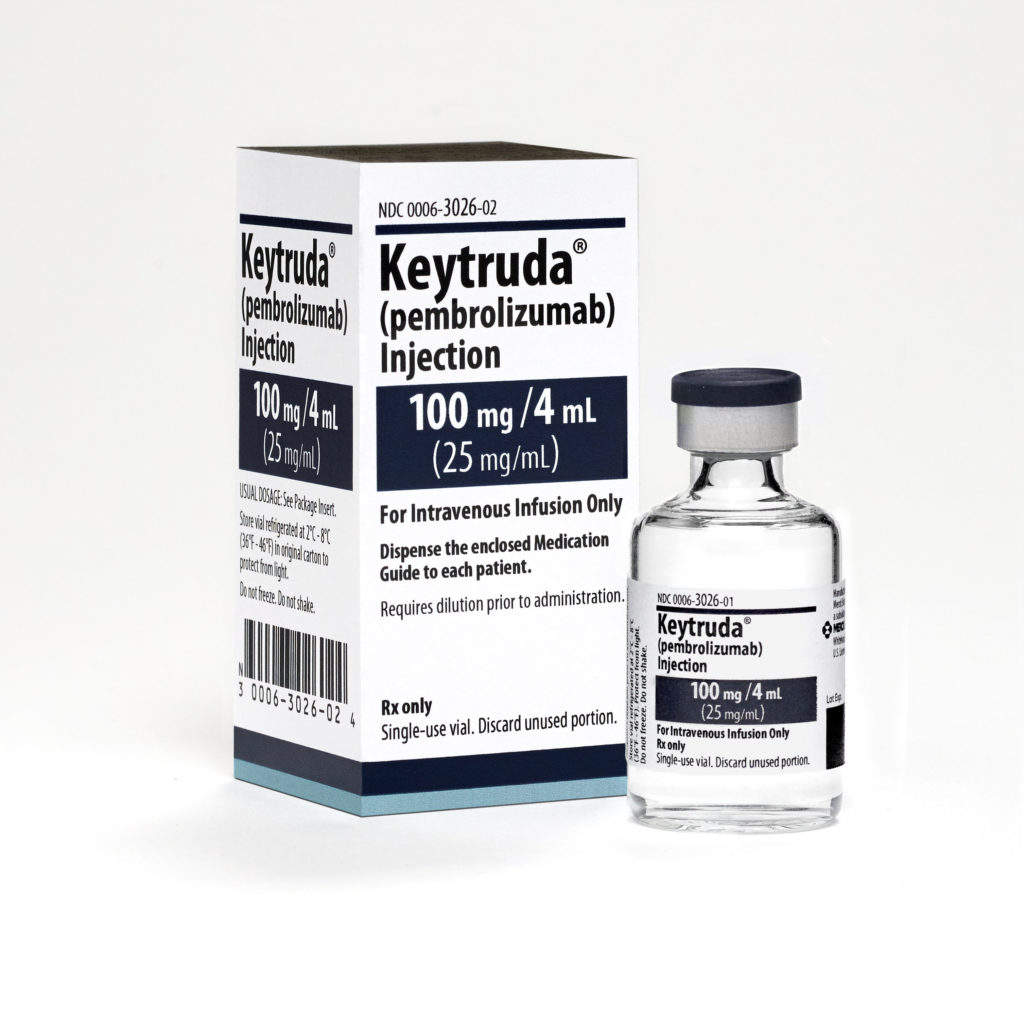Merck and Eisai announced that the pivotal Phase 3 KEYNOTE-775/Study 309 trial evaluating the investigational use of KEYTRUDA, Merck’s anti-PD-1 therapy, plus LENVIMA, the orally available multiple receptor tyrosine kinase inhibitor discovered by Eisai, met its dual primary endpoints of overall survival (OS) and progression-free survival (PFS) and its secondary efficacy endpoint of objective response rate (ORR) in patients with advanced endometrial cancer following at least one prior platinum-based regimen.

Image: Merck’s anti-PD-1 therapy Keytruda. (Credit: Merck Sharp & Dohme Corp.)
Subscribe to our email newsletter
These positive results were observed in the mismatch repair proficient (pMMR) subgroup and the intention-to-treat (ITT) study population, which includes both patients with endometrial carcinoma that is pMMR as well as patients whose disease is microsatellite instability-high (MSI-H)/mismatch repair deficient (dMMR). Based on an analysis conducted by an independent Data Monitoring Committee, KEYTRUDA plus LENVIMA demonstrated a statistically significant and clinically meaningful improvement in OS, PFS and ORR versus chemotherapy (treatment of physician’s choice [TPC] of doxorubicin or paclitaxel). The safety profile of the KEYTRUDA plus LENVIMA combination was consistent with previously reported studies. Merck and Eisai will discuss these data with regulatory authorities worldwide, with the intent to submit marketing authorization applications based on these results, and plan to present these results at an upcoming medical meeting.
“Women with advanced endometrial cancer are faced with high mortality rates and limited treatment options following initial systemic therapy,” said Dr. Gregory Lubiniecki, Associate Vice President, Oncology Clinical Research, Merck Research Laboratories. “These are the first results from a Phase 3 trial of a combination regimen including immunotherapy in advanced endometrial carcinoma that have shown a statistically significant improvement in overall survival, progression-free survival and objective response rate versus chemotherapy. Merck and Eisai are dedicated to continuing to research the KEYTRUDA plus LENVIMA combination and discover new approaches to address unmet needs for devastating diseases such as endometrial carcinoma.”
“We are encouraged by the data observed in KEYNOTE-775/Study 309, which represent a possible step forward for patients impacted by advanced endometrial carcinoma and support the results seen in the advanced endometrial cancer cohort of KEYNOTE-146/Study 111,” said Dr. Takashi Owa, Vice President, Chief Medicine Creation Officer and Chief Discovery Officer, Oncology Business Group at Eisai. “As more clinical data from the LEAP (LEnvatinib And Pembrolizumab) program are revealed, we cannot help but be energized by the trajectory of our collaboration with Merck and the benefits we hope to provide to patients together. Most importantly, we are grateful for the trust that the patients and healthcare professionals who participated in this trial have shown us.”
KEYNOTE-775/Study 309 is the confirmatory trial for KEYNOTE-146/Study 111, which supported the U.S. Food and Drug Administration’s (FDA) 2019 accelerated approval of the KEYTRUDA plus LENVIMA combination for the treatment of patients with advanced endometrial carcinoma that is not MSI-H or dMMR, who have disease progression following prior systemic therapy and are not candidates for curative surgery or radiation. This accelerated approval was based on tumor response rate and durability of response and was the first approval granted under Project Orbis, an initiative of the FDA Oncology Center of Excellence that provides a framework for concurrent submission and review of oncology drugs among its international partners. Under Project Orbis, Health Canada and Australia’s Therapeutic Goods Administration (TGA) granted conditional and provisional approvals, respectively, for this indication.
Merck and Eisai are studying the KEYTRUDA plus LENVIMA combination through the LEAP (LEnvatinib And Pembrolizumab) clinical program in 13 different tumor types across 20 clinical trials, including a Phase 3 trial evaluating the combination in the first-line setting for patients with advanced endometrial carcinoma (LEAP-001).
Source: Company Press Release
 Advertise With UsAdvertise on our extensive network of industry websites and newsletters.
Advertise With UsAdvertise on our extensive network of industry websites and newsletters.
 Get the PBR newsletterSign up to our free email to get all the latest PBR
news.
Get the PBR newsletterSign up to our free email to get all the latest PBR
news.

